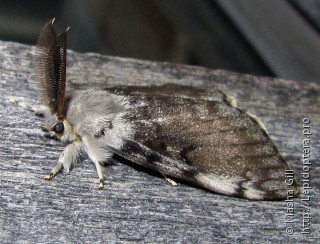Ships in Maritimes are being searched for invasive moth
Community and Forum → Blog → Ships in Maritimes are being searched for invasive moth
Lev Bely, 01.09.2012 22:31

Federal inspectors in Halifax, Canada, search 2—3 ships a week checking for signs of invasive Asian gipsy moth (Lymantria dispar). This supposedly can do serious damage to Maritime forests.
The checking procedure may take place only at the Nova Scotia coast, hence those ships going to Saint John in Canadian province of New Brunswick, have to change their course.
Canadian Food Inspection Agency (CFIA) in Halifax reports that this year they searched by now 80 ships coming into Canadian waters after resting at ports in Japan, Korea, China and Russia, which are deemed as of a high-risk.
Inspection Manager Scott Bishop says that they recently boarded an LNG supertanker headed for Saint John. Tanker had to turn aside to Chebucto Head. “They were coming from Europe. So they would have been stopped before they came into the Bay of Fundy,” Bishop said.
The agency says it has found out an alarming number of egg nests on ships by the Pacific Coast. Meanwhile, the very coast still stays peaceful: no L. dispar moth nests found so far in the searching area.
Forestry researcher David Gray believes it would be a real disaster to have there Asian gipsy moth.
“Because the Asian strain has a much wider range of host range, which means it will feed on many more species than does the North American strain, it poses a concern to rural forests, to urban forests, to streetscapes, to nurseries, to orchards,” Gray said. “So it is a concern. We'd like to keep it out as long as possible.”
Four oil tankers going to New Brunswick were also searched amidst others this year.
CBC/Radio-Canada, http://cbc.radio-canada.ca
Photo: L. dispar moth
All the rest posts on: Pests, Canada, danger zone, ecology
Comments
New comment
Note: you should have a Insecta.pro account to upload new topics and comments. Please, create an account or log in to add comments.
* Our website is multilingual. Some comments have been translated from other languages.
Random species of the website catalog
News
- 02.03.2025: Moscow Insect Fair: New section on the Insecta.pro Website
- 31.12.2024: If you need to upload a lot of photos to Insecta.pro website
- 10.12.2024: Новое поле в «Поиске энтомологов»
New photos (10.03.2025)
Fresh from the community
- 22:21, P. Khramov: Geometridae / Oleg Semin → Calcarit...
- 17:10, N. Grebennikov: Calcaritis pallida ....
- 18:30, V. Kolesnikov: maybe Sympecma gobica...
Popular insects
Recommended blog topics
- ICZN Election of Commissioners
- A. Gordon, O. Gorbunov, V. Murzin on Russian TV in 2004
- British Lepidoptera are reducing alarmingly: exactly 72% of species



























